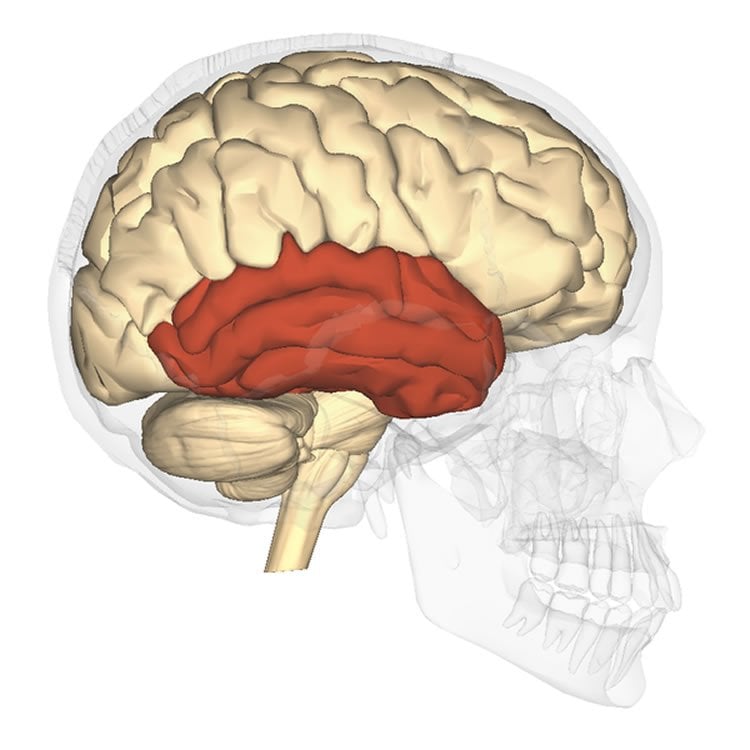Summary: Vanderbilt researchers report elderly people whose hearts pump less blood have reduced blood flow in the temporal lobe. Previous studies report the temporal lobe is a critical brain area for the development of Alzheimer’s disease.
Source: Vanderbilt University.
Research by a team of Vanderbilt University Medical Center (VUMC) scientists suggests that older people whose hearts pump less blood have blood flow reductions in the temporal lobe regions of the brain, where Alzheimer’s pathology first begins.
The brain, which accounts for only 2 percent of total body weight, typically receives 12 percent of blood flow from the heart — a level maintained by complex, automatic processes, which maintain consistent blood flow to the brain at all times.
Angela Jefferson, Ph.D., director of the Vanderbilt Memory and Alzheimer’s Center, and colleagues investigated whether lower cardiac index (the amount of blood flowing out of the heart adjusted for body size) correlated with lower blood flow to the brain.
The purpose of the study was to better understand whether reductions in brain blood flow might explain clinical observations in prior research that have linked heart function to cognitive impairment, Alzheimer’s disease and dementia.
“We currently know a lot about how to prevent and medically manage many forms of heart disease, but we do not yet know how to prevent or treat Alzheimer’s disease,” Jefferson said.
“This research is especially important because it may help us leverage our knowledge about managing heart health to address and treat risk factors for memory loss in older adults before cognitive symptoms develop.”
The study, published online in Neurology Nov. 8, involved 314 Vanderbilt Memory and Aging Project participants with an average age of 73. Thirty-nine percent had mild cognitive impairment, a condition that increases the risk of developing Alzheimer’s disease or dementia, while the remaining participants had normal cognitive function.
Cardiac index was measured with echocardiography, and blood flow in the brain was measured with magnetic resonance imaging (MRI).
The magnitude of the association between lower cardiac index and lower cerebral blood flow in the temporal lobe, a brain region critical for memory processing, was estimated to correspond to 15 to 20 years of advancing age.
“One way to put these results into a meaningful context is to define how one year of aging relates to blood flow in the brain,” Jefferson said. “Then, we compare the effect of one year of aging to the effect of lower cardiac index. When we do that, we find that the effect of cardiac index on blood flow in the temporal lobes corresponds to 15 to 20 years of age.”

The individuals who participated in the research are part of a longitudinal study that will continue to track their health and cognitive abilities.
The study raises questions about whether autoregulation of blood flow in the brain is less effective as people age, Jefferson said, as well as the greater role that vascular health may play in exacerbating Alzheimer’s pathology or clinical symptoms of dementia.
“It is now clear from a growing body of research evidence that there is a strong connection between heart health and brain health,” said Maria Carrillo, Ph.D., chief science officer of the Alzheimer’s Association, which helped fund the study.
“We are pleased to have provided the initial seed funding for this intriguing science that is beginning to identify and investigate the mechanisms behind that connection. Those mechanisms, once confirmed, may hold the key to effective treatments and prevention strategies for Alzheimer’s disease and other dementias.”
Jefferson is the lead author of the study with 13 Vanderbilt colleagues as co-authors from neurology, radiology and radiological sciences, cardiovascular medicine, geriatrics and biostatistics.
Funding: The study was funded by the Alzheimer’s Association, the National Institute on Aging, National Institute of Neurological Disorders and Stroke, American Heart Association, Paul B. Beeson Career Development Award in Aging, Vanderbilt Clinical Translational Science Award and the Vanderbilt Memory and Alzheimer’s Center.
Source: Tom Wilemon – Vanderbilt University
Publisher: Organized by NeuroscienceNews.com.
Image Source: NeuroscienceNews.com image is credited to Anatomography, licensed CC BY-SA 2.1 JP.
Original Research: The study will appear in Neurology.
[cbtabs][cbtab title=”MLA”]Vanderbilt University “Link Between Brain’s Memory Center and Heart Function.” NeuroscienceNews. NeuroscienceNews, 8 November 2017.
<https://neurosciencenews.com/alzheimers-heart-function-memory-7906/>.[/cbtab][cbtab title=”APA”]Vanderbilt University (2017, November 8). Link Between Brain’s Memory Center and Heart Function. NeuroscienceNews. Retrieved November 8, 2017 from https://neurosciencenews.com/alzheimers-heart-function-memory-7906/[/cbtab][cbtab title=”Chicago”]Vanderbilt University “Link Between Brain’s Memory Center and Heart Function.” https://neurosciencenews.com/alzheimers-heart-function-memory-7906/ (accessed November 8, 2017).[/cbtab][/cbtabs]






